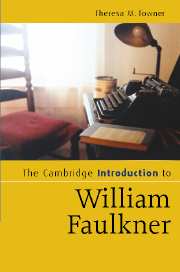Blotner, Joseph. Faulkner: A Biography. One-volume edition. New York: Random House, 1984. The gold standard in Faulkner biography; clearly written and informative.
Brooks, Cleanth. William Faulkner: The Yoknapatawpha Country. New Haven: Yale University Press, 1963. Excellent New Criticism; one of the most influential readings of the Yoknapatawpha novels.
Brown, Calvin S.A Glossary of Faulkner's South. New Haven and London: Yale University Press, 1976. Indispensable explanations of the fast-disappearing South that Faulkner knew.
Carothers, James B.William Faulkner's Short Stories. Ann Arbor: UMI Research Press, 1985. Solid New Critical reading of patterns in the short fiction.
Davis, Thadious. Faulkner's “Negro”: Art and the Southern Context. Baton Rouge: Louisiana State University Press, 1983. With Sundquist, the starting point for modern study of race in Faulkner.
Hamblin, Robert W. and Peek, Charles A., eds. A William Faulkner Encyclopedia. Westport, CT: Greenwood Press, 1999. Digests of characters, works, major figures real and imagined, and intellectual movements important to Faulkner's career; highly reliable and with excellent guides to further reading.
Jehlen, Myra. Class and Character in Faulkner's South. New York: Columbia University Press, 1976. One of the first to apply cultural studies to Faulkner's work.
Kawin, Bruce. Faulkner and Film. New York: Ungar, 1977. Good guide to Faulkner and Hollywood.
Kreiswirth, Martin. William Faulkner: The Making of a Novelist. Athens: University of Georgia Press, 1983. Analysis of Faulkner's apprenticeship as a prose writer.
Matthews, John T.The Play of Faulkner's Language.Ithaca, NY: Cornell University Press, 1982. Deconstructionist reading of Faulkner's major works.
Millgate, Michael. The Achievement of William Faulkner. New York: Random House, 1966. Most important New Critical work on Faulkner's career, including a fine short biography.
Peek, Charles A. and Hamblin, Robert W., eds. A Companion to Faulkner Studies. Westport, CT: Greenwood Press, 2004. Accessible and informative essays on major schools of criticism as applied to Faulkner – mythological, postmodern, feminist, for example. Includes excellent glossary of critical terms.
Polk, Noel. Children of the Dark House: Text and Context in Faulkner. Jackson: University Press of Mississippi, 1996. Includes looks at Faulkner's less-known prose and performances, particularly as they reflect gender concerns.
Roberts, Diane. Faulkner and Southern Womanhood. Athens: University of Georgia Press, 1994. Discussion of Faulkner's use of inherited types of female characters – the lady, the mammy, for example.
Ross, Stephen M.Fiction's Inexhaustible Voice: Speech and Writing in Faulkner. Athens: University of Georgia Press, 1983. Insightful on auditory qualities of Faulkner's prose – a unique take.
Schwartz, Lawrence H.Creating Faulkner's Reputation: The Politics of Modern Literary Criticism. Knoxville: University of Tennessee Press, 1988. Reads Faulkner's career as deliberately promoted by Cold War political concerns.
Skei, Hans H.William Faulkner: The Short Story Career. Oslo: Universitetsforlaget, 1981. Includes useful analysis of composition and publication of the short stories.
Sundquist, Eric J.Faulkner: The House Divided. Baltimore and London: Johns Hopkins University Press, 1983. With Davis, the starting point for modern studies of race in Faulkner.
Towner, Theresa M.Faulkner on the Color Line: The Later Novels. Jackson: University Press of Mississippi, 2000. Addresses Faulkner's interest in culturally constructed ideas about “race.”
Urgo, Joseph R.Faulkner's Apocrypha: A Fable, Snopes, and the Spirit of Human Rebellion. Jackson: University Press of Mississippi, 1989. Groundbreaking reading of Faulkner's career after 1942.
Weinstein, Philip M., ed. The Cambridge Companion to William Faulkner. Cambridge: Cambridge University Press, 1995. Far-ranging collection of fresh interpretations of Faulkner's career.
Williamson, Joel. William Faulkner and Southern History. Compendium on the topic, with the detailed biographies of Faulkner's ancestors in historical context, and the case for Colonel William Clark Falkner's “shadow family.”



